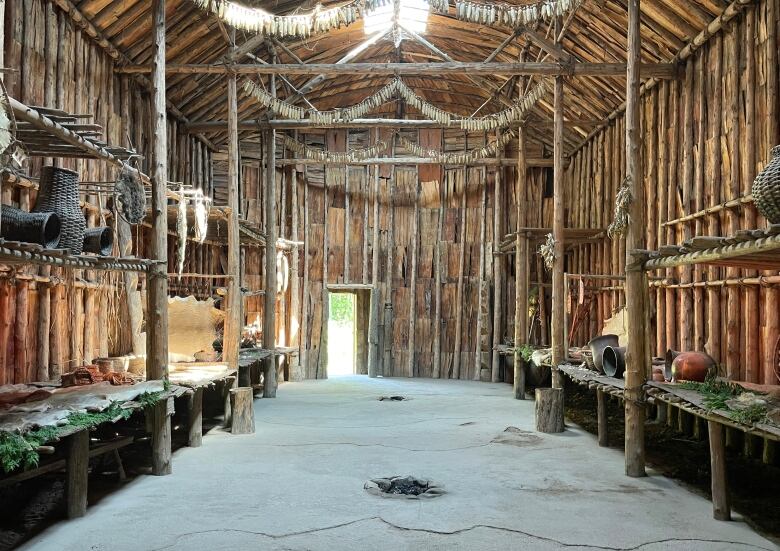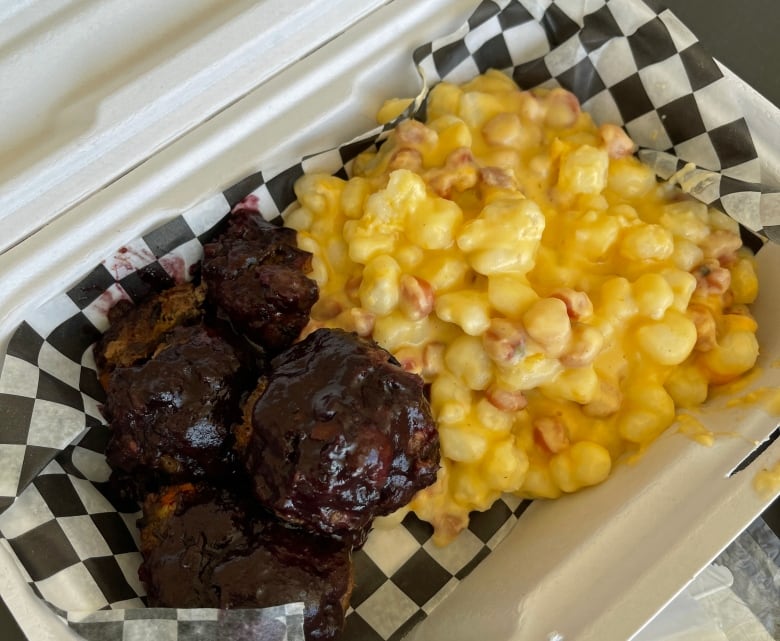These Indigenous chefs are serving delicious dishes in food trucks and lunch spots
Try these spots in Milton, Ohsweken, and near Bowmanville, says Suresh Doss

Metro Morning's food guide Suresh Doss visited three Indigenous chefs in the Greater Toronto - Hamilton Area who are serving up a bit of their culture with their creative dishes.
- Johl White-Ringuette has taken over the canteen kitcehn in the Crawford Lake Conservation Area in Milton.
- Chef Ian Patterson's food truck is on Highway 115, just east of Bowmanville.
- Chef Tawnya Brant runs her lunch counter, Yawekon, in Osheweken.
Ismaila: Tell us about these chefs and their restaurants.
Johl White-Ringuette's canteen kitchen
Suresh: Let's start with chef Johl White-Ringuette. Johl was the owner and chef behind the popular Toronto restaurant, Nish Dish.
He was born in North Bay, he is Anishinawbe and Algonquin. And aside from being a leader with First Nations cuisine and Indigenous ingredients, he was also regarded as a culinary historian. He helped launch the Ojibiikaan Indigenous Cultural Network. He has spent a considerable amount of time educating and advocating for Indigenous food sovereignty. Nish Dish started off as a catering business nearly 20 years ago before it became a restaurant on Bloor Street near Christie in 2017.
Ismaila: I've definitely heard of it even before moving to Toronto. What was the food like there?
Suresh: You would go for a wild boar breakfast burrito. You would have roasted coffee sourced from the Kanasatake Mohawk settlement. The venison stew there was really popular. But more than a restaurant, it was a place where you could gather and meet people and find products made by indigenous artisans.
But like many restaurants, unfortunately, it closed during COVID.
Ismaila: But you managed to locate the chef?
Suresh: Yeah luckily about a month ago I saw that he posted on Instagram that he had taken over the canteen kitchen at the Crawford Lake Conservation Area in Milton. Johl is set up here every weekend until the end of October. He's got a pretty small menu, mostly vegetarian, there are a number of salads on the menu.
I had this great wild rice salad with mushrooms and peppers. I also had bison sausage, served on a bun, which was great. The location is very important too; it's the site of a 15th century Iroquoian village, where nearly a dozen longhouses were found through excavations from 1973 to 1987. Three of the longhouses have been restored to give a glimpse into what life was like 600 years ago.
So I recommend you make this trip. You have to make reservations ahead of time to get into the park, and you can do that at parkvisit.ca.
Ismila: It sounds like a trip to Crawford Lake is more than just about the food.
Suresh: Dual purposes here: to eat and to learn. I think its a necessary that we take this trip to get a better understanding of our history. And we all need to make the effort right now.

The Anishinaabe Shack — Ian Patterson
Suresh: So east of Toronto, there is an Indigenous-owned food truck that I heard about, again through social media.
It's called the Anishinaabe Shack. It's is a truck that is permanently parked east of Bowmanville. It's on Highway 115 at the Petro gas station just north of the 401. You kind of can't miss it.
Ian Patterson runs this truck with his mom, Sandra. Ian and his family started as a food popup a few years ago focusing on bannock. It would vend at pow wows from Peterborough to St Catharines. It's a grandmother's recipe of simple bread that is fried and used as a canvas in a few different ways.

Ismaila: I'll never forget my first time trying bannock, when I was 9 or 10 years old. I just loved it.
Suresh: So the bannock is made to order here, rolled out and fried until it puffs up, so it's got a little crisp surface and pillowy centre.
You can have it topped with a homemade chili, that Ian makes with beef and vegetables. And then you can dress it with lettuce, and tomato jam and sour cream
You can also have the bannock as open faced hot dog, dressed how you like, and then fold the bread around the meat
And the most popular version — the bannock is smeared in butter, then generously dressed with cinnamon sugar and thick drizzles of honey. Because they bread is freshly fried, its incredibly soft and airy, it works really well as this warm treat.
Ismaila: Savoury or sweet, I think bannock is pure gold. Now, tell us about the third chef.
Tawnya Brant's lunch counter
Suresh: Tawnya Brant is an incredibly talented chef that I've had the honour of finally meeting earlier this year. Brant is Haudenosaunee and her home is in the Six Nations of the Grand River Territory in Ohsweken.
She is a Mohawk (Kanyen'kehá:ka) woman from the Tekarihoken Turtle clan. Tawnya is regarded as a culinary ambassador, a teacher, and a person that is dedicated to revitalizing indigenous cuisine through forgotten heirloom ingredients.

During Covid, she opened a lunch counter in the Iroquois village called Yawekon. The best way I can describe her cooking, is that she's got this incredible way of re-imagining familiar dishes, and she will use Indigenous and heirloom ingredients.
One week you may find bison meatballs that are served with zucchini noodles. Or bean and rice tacos stuffed with peppers.
I had this really wonderful butter chicken, but underneath the sauce and the chicken was this bed of wild rice and hominy. The textural contrast of the wild rice and hominy was a revelation. Better than any of the ones I grew up with.

Ismaila: That sounds incredible.
Suresh: Oh, there is more... There's a pulled bison with lots of gravy over blue cornbread and a side salad What's also impressive is that Brant changes the menu every week, which is really rare.
It's delicious sustenance, but if you look closely you'll notice that with each dish, she's also trying to nourish your mind. I've had a number of really good meals at Yawekon. I highly recommend a visit.